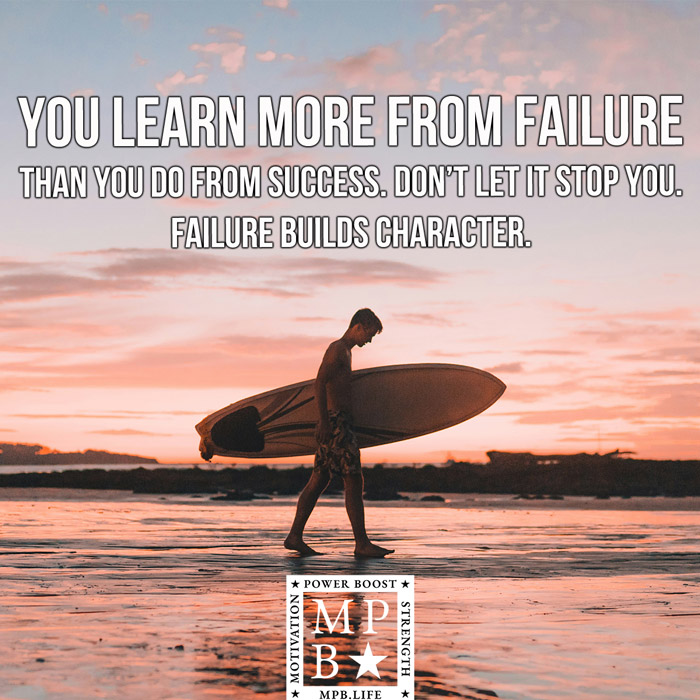
You Learn More From Failure Than You Do From Success Graphic © motivationpowerboost.com
You Learn More From Failure Than You Do From Success.
Don’t let it stop you. Failure builds character.
Embracing the Lessons of Failure: Building Character and Resilience
Failure, often feared and avoided, is an inherent part of the human experience. It is through these moments of perceived defeat that we uncover the most valuable lessons and opportunities for growth. While success is undeniably rewarding, it is failure that truly shapes our character and propels us forward on the path to self-discovery and resilience.
When we encounter failure, we are forced to confront our weaknesses, limitations, and areas for improvement. It is in these challenging moments that we gain a deeper understanding of ourselves and the world around us. Failure compels us to reassess our strategies, question our assumptions, and seek out new approaches. Through this process of introspection and adaptation, we cultivate a growth mindset that embraces challenges as opportunities for learning and development.
Moreover, failure teaches us the invaluable lesson of perseverance. Success often comes easily, but it is through the trials and tribulations of failure that we build the tenacity and determination necessary to overcome obstacles. Each setback we face becomes a testament to our resilience and our ability to pick ourselves up, dust ourselves off, and continue forward with renewed purpose and resolve.
Failure also fosters humility and empathy. When we experience the sting of defeat, we develop a greater appreciation for the struggles and challenges that others face. We learn to approach life with a more compassionate and understanding lens, recognizing that everyone encounters roadblocks and setbacks on their journey. This heightened sense of empathy allows us to connect more deeply with others and build stronger, more meaningful relationships.
Furthermore, failure serves as a catalyst for innovation and creativity. When our initial plans and strategies prove ineffective, we are pushed to think outside the box and explore new possibilities. It is often in the face of failure that we are most motivated to break free from conventional thinking and embrace unconventional solutions. Many of the world’s greatest inventions, discoveries, and breakthroughs were born from the ashes of failure, as individuals refused to accept defeat and instead used their setbacks as springboards for ingenuity.
In the grand tapestry of life, failure is not a blemish to be concealed or a source of shame to be avoided. Rather, it is a vital thread that adds depth, texture, and character to our personal narratives. By embracing failure as an integral part of our growth and development, we unlock the power to transform challenges into triumphs and setbacks into stepping stones.
So, the next time you encounter failure, remember that it is not a roadblock, but rather a detour on the path to success. Embrace the lessons it offers, allow it to strengthen your character, and use it as a catalyst for personal and professional growth. In doing so, you will discover that failure is not something to be feared, but rather a powerful teacher guiding you towards a more resilient, empathetic, and purposeful version of yourself.
The Power of Reframing Failure: A Mindset Shift
While failure can be a difficult experience, the true transformative power lies in our ability to reframe it. Instead of viewing failure as an obstacle, we can choose to perceive it as an opportunity for growth and self-discovery. This mindset shift requires a conscious effort to challenge our negative associations with failure and to embrace a more positive and constructive perspective.
One effective approach is to redefine failure as a temporary setback rather than a permanent state. By acknowledging that failure is a natural part of the learning process and not a reflection of our inherent worth or capabilities, we can more easily move past the initial disappointment and focus on the lessons and insights gained. This shift in perspective allows us to maintain a sense of hope and resilience, knowing that each failure brings us one step closer to eventual success.
Additionally, we can reframe failure as a chance to develop essential life skills. Every setback presents an opportunity to strengthen our problem-solving abilities, critical thinking skills, and adaptability. By approaching failures as challenges to overcome, we cultivate a growth mindset that embraces continuous learning and improvement. This mindset not only enhances our resilience but also equips us with valuable tools for navigating the complexities of life.
Furthermore, reframing failure can foster a greater appreciation for the journey itself. Instead of solely fixating on the destination or desired outcome, we can learn to find value and meaning in the process. Each failure becomes a stepping stone, offering valuable insights and experiences that shape our personal and professional development. This mindset shift enables us to savor the lessons, celebrate small victories, and derive satisfaction from the progress we make along the way.
Ultimately, the power of reframing failure lies in our ability to shift our perspective from one of defeat to one of empowerment. By consciously choosing to view failures as opportunities for growth, learning, and self-discovery, we unlock a reservoir of resilience and determination that propels us forward on our journey towards personal and professional fulfillment.
Related Inspirational Quotes
“Failure is a bend in the road, not the end of the road. Learn from failure and keep moving forward.” – Roy T. Bennett
“The man who has experienced shipwreck shudders even at a calm sea.” – Ovid
“Our greatest glory is not in never falling, but in rising every time we fall.” – Confucius
“I have not failed. I’ve just found 10,000 ways that won’t work.” – Thomas A. Edison
“The phoenix must burn to emerge.” – Janet Fitch
